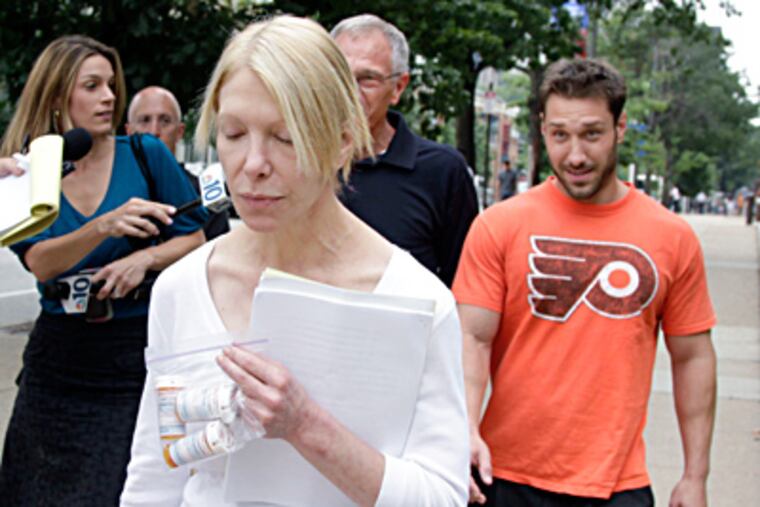Frank L. Rizzo's daughter among those charged in gambling
Gentleman gambler Joseph "Joe Vito" Mastronardo turned his multimillion-dollar bookmaking business into a family affair, federal authorities charged Wednesday, using his wife, Joanna, and his son, Joseph F. "Joey" Mastronardo, in the gambling operation.

Gentleman gambler Joseph "Joe Vito" Mastronardo turned his multimillion-dollar bookmaking business into a family affair, federal authorities charged Wednesday, using his wife, Joanna, and his son, Joseph F. "Joey" Mastronardo, in the gambling operation.
Joanna Mastronardo, 62, is the daughter of the late Frank L. Rizzo. Joey Mastronardo, 30, is the grandson of the law-and-order mayor and police commissioner.
In a 23-count indictment unsealed Wednesday, federal authorities allege that Joe Vito Mastronardo, 62, and his brother John, 57, headed an international sports betting business that generated millions of dollars in action over six years beginning in 2005.
The indictment charges that the "Mastronardo Bookmaking Operation" used the Internet, Skype, text messaging and telephones to communicate with thousands of customers who bet millions of dollars.
The brothers are accused of setting up two websites, www.betroma.com and www.betrose.com, and an office in Costa Rica through which wagers were processed. The indictment also lists wire transfers of hundreds of thousands of dollars in gambling profits to banks in Malta, Portugal, Sweden, and Antigua.
The four Mastronardos and 12 codefendants who allegedly worked for them were arrested early Wednesday and were released on bail following preliminary hearings in U.S. District Court.
Bail was set at $250,000 for Joe Vito Mastronardo and $100,000 for John Mastronardo. Bail for most of the other defendants was set at $50,000.
Joanna Mastronardo, like the other defendants, was led into court with her hands cuffed behind her back. She wore a long-sleeved white T-shirt and jeans.
Her husband and son were also dressed casually. Joe Vito Mastronardo wore a white T-shirt, and his son wore a Ron Hextall T-shirt and black shorts.
Neither Joanna Mastronardo nor any of the other defendants commented during the hearings, which were simply designed to formalize the charges. Arraignments are expected within the next week, at which time the defendants will likely enter not-guilty pleas.
The Mastronardo brothers, legendary figures in the sports betting business, have long been targets of law enforcement. John is a former standout football player at Villanova. and Joe Vito is considered one of the smartest handicappers in the business.
The case grew out of an investigation by the Montgomery County District Attorney's Office in 2010.
More than $2 million in cash was seized by investigators in that probe, including more than $1 million found hidden in PVC pipes buried in the lawn of Joseph and Joanna Mastronardo's home in Meadowbrook.
In 2007, then-Montgomery County District Attorney Bruce L. Castor Jr. announced that authorities had seized $2.7 million from the brothers in another gambling probe.
Joe Vito and John Mastronardo eventually pleaded guilty to minor gambling charges after agreeing not to contest the seizure of the cash. Part of the "leverage" Castor used in that deal, according to sources, was the threat of charging other members of the Mastronardo family, including Joe Vito's elderly parents and his wife.
Attempts to work out a similar arrangement with federal authorities in the current case that would have kept Joanna Mastronardo from being charged did not work out, according to a source familiar with the investigation.
Dennis Cogan, the longtime lawyer for the Mastronardo brothers, said Wednesday's indictment was not unexpected.
Cogan described Joe Vito Mastronardo as a well-known "gentleman gambler" who "never hurt anyone" and who had no ties to organized crime.
In state court, Cogan said, "these kinds of charges used to be misdemeanors." But he acknowledged that federal authorities had expanded the case into a racketeering conspiracy enterprise built around wire transfers, interstate communications, and allegations of money-laundering.
Cogan said past cases in which his client was targeted show that customers who bet with the Mastronardos were never threatened or intimidated.
"The only punishment," he said, "was that if you didn't pay, you couldn't bet anymore."
Cogan questioned the government's decision to stage of a series of raids to arrest the 16 defendants, all of whom would have voluntarily surrendered had they been notified, he said.
Instead, he said, the government used dozens of agents from the FBI and other law enforcement agents "to keep the streets safe . . . for SugarHouse." The SugarHouse Casino is a few blocks from the federal courthouse where the Mastronardos and other defendants were processed.
The indictment alleges that even while on probation following a 2007 conviction for gambling in Montgomery County, Joe Vito Mastronardo and his brother continued to run their sports betting business.
The case is built in part on secretly recorded conversations and on information provided by cooperating witnesses.
In one conversation cited in the indictment, Joe Vito Mastronardo apparently boasted about his son's involvement, telling a codefendant, "If you're not committed to the bookmaking business, like my son, then you have too much free time and you just get in trouble."
In another conversation he allegedly bragged about having millions of dollars invested in Costa Rica and said that he once loaned $2 million to another sports betting operator there.
The government is seeking more than $6 million in forfeitures as part of the case.
The Mastronardo brothers and most of the other defendants are charged with racketeering conspiracy and related offenses connected to the gambling operation.
Joanna Mastronardo is the only defendant not facing a racketeering charge. She was named in one count of the indictment, alleging that she made a series of 72 cash bank deposits, each for less than $10,000, for her husband's gambling business during one 12-month period.
The deposits, which totaled more than $500,000, were designed to thwart banking regulations that required disclosure forms for any deposit in excess of $10,000, authorities allege. The charge is known as "structuring" and is a frequent tactic used by organized crime and drug dealing figures trying to hide their income.